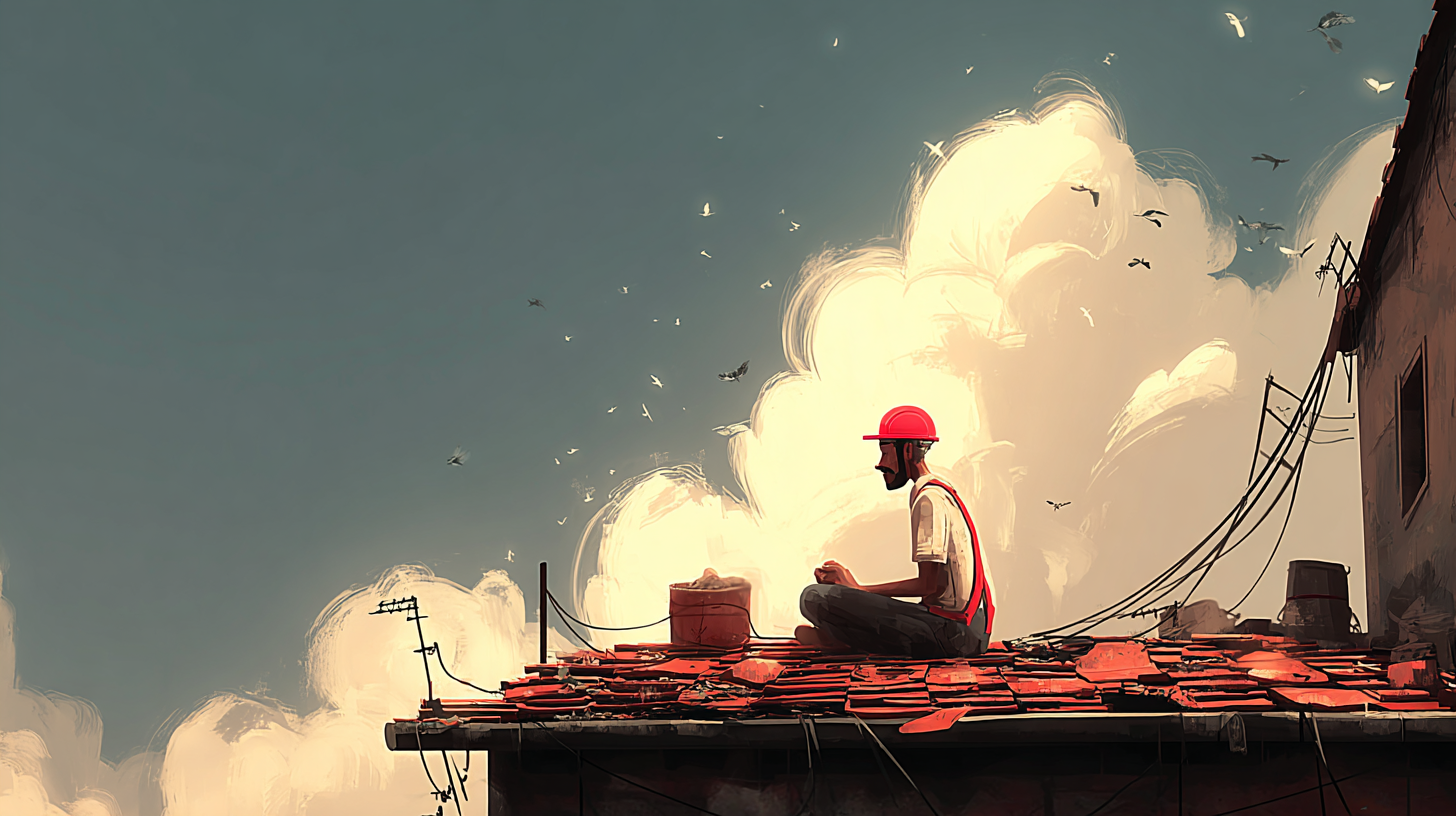A “roof” is the top cover of a building.
「roof」は建物の一番上にある「屋根」のこと。
以下は英単語 “roof” に関するストーリー型学習コンテンツです。まずは大枠の意味を理解して最後の文章で確認しましょう。
主な意味(main meaning)
| 品詞 | 発音記号 (IPA) | 意味 | 英語例文 |
|---|---|---|---|
| 名詞 | /ruːf/ | 建物の上をおおう部分、屋根 | The roof of the house was damaged by the storm. |
| 動詞 | /ruːf/ | 屋根をつける、屋根をおおう | They roofed the new garage last weekend. |
語源(etymology)
「roof」は古英語「hrōf」に由来し、「覆うもの」「上にあるもの」という意味から派生。核のイメージは「上から守るカバー」。
類義語(synonyms)
| 類義語 | 意味 | 英語例文 |
|---|---|---|
| ceiling | 天井 | The ceiling of the room was painted white. |
| shelter | 避難所、覆うもの | The small hut gave them shelter from the rain. |
| canopy | 覆い、ひさし | The canopy protected us from the sun. |
| cover | 覆い、ふた | The plastic cover kept the books dry. |
反義語(antonyms)
| 反義語 | 意味 | 英語例文 |
|---|---|---|
| floor | 床 | The children were playing on the floor. |
| ground | 地面 | He sat down on the ground to rest. |
コロケーション(collocations)
| コロケーション | 英語例文 |
|---|---|
| flat roof | The building has a flat roof. |
| roof tiles | Workers replaced the broken roof tiles. |
| roof garden | They enjoyed lunch on the roof garden. |
| roof repair | The company offers roof repair services. |
| under one roof | Many shops are gathered under one roof. |
2項表現(binomials)
| 2項表現 | 英語例文 |
|---|---|
| roof and walls | A house needs both roof and walls. |
| floor and roof | The builders checked the floor and roof carefully. |
英語ストーリー(english story)
Mr. Brown was the manager of a small office building in town. One Monday morning, after a heavy storm during the night, he received a phone call from a tenant on the fifth floor. The tenant said, “Mr. Brown, there is water leaking from the ceiling. Could you please come and check?”
Mr. Brown quickly went upstairs to investigate. When he entered the office, he saw that the ceiling had a large wet stain, and drops of water were falling onto the floor. He immediately realized that the problem must be with the roof.
He went outside and climbed to the top of the building. The roof tiles had been damaged by the strong wind. Some of them were broken, and others were missing. Mr. Brown thought, “I must arrange a roof repair as soon as possible. Without a proper roof, the whole building is at risk.”
He called a construction company, and the workers promised to come in the afternoon. Meanwhile, he told the tenants to move their desks and computers away from the wet ceiling. “Please wait,” he said, “the problem will be solved soon. You are all working under one roof, and I must keep you safe.”
That afternoon, the workers arrived. They carefully checked both the floor and roof. One worker explained, “The storm broke some of the tiles, but we can replace them today.” They worked for hours, putting on new tiles and fixing the broken parts.
During the work, Mr. Brown had a short conversation with the foreman.
“Is this a common problem?” asked Mr. Brown.
“Yes,” the foreman replied. “Strong winds can easily damage a flat roof. But once we replace the tiles, it will be fine. A building needs both roof and walls to protect the people inside.”
By evening, the roof repair was complete. The new tiles looked strong and reliable. The workers even checked the roof garden, where some tenants liked to have lunch. Everything was safe again.
The next morning, the tenant who had called earlier came to see Mr. Brown. She said, “Thank you so much for your quick action. Without the roof, we could not continue working. It really is our shelter.”
Mr. Brown smiled. “Yes, a roof is more than just a cover. It protects us, like the ceiling over your head. Now we can all feel secure again.”
The building was once again peaceful, and everyone could continue working without worry.
和訳
ブラウンさんは町の小さなオフィスビルの管理人でした。ある月曜の朝、夜の大嵐の後で、5階のテナントから電話がありました。
「ブラウンさん、天井(ceiling)から水が漏れています。見に来てもらえますか?」
ブラウンさんはすぐに上の階へ確認に行きました。オフィスに入ると、天井(ceiling)に大きなシミがあり、水滴が床(floor)に落ちていました。彼はすぐに問題は屋根(roof)だと気づきました。
外に出てビルの屋上に上がると、屋根瓦(roof tiles)が強風で壊れていました。いくつかは割れ、いくつかはなくなっていました。
「すぐに屋根修理(roof repair)を手配しなければ。この屋根(roof)がなければ、ビル全体が危険だ。」と考えました。
彼は建設会社に電話し、作業員たちは午後に来ると約束しました。その間、テナントたちに机やパソコンを濡れた天井から離すよう指示しました。
「少し待ってください。すぐに解決します。皆さんは一つ屋根の下(under one roof)で働いているのですから、安全を守らなければ。」
午後、作業員たちが到着しました。彼らは床(floor)と屋根(roof)の両方を確認しました。作業員の一人が言いました。
「嵐で瓦が壊れましたが、今日中に交換できます。」
彼らは何時間もかけて新しい瓦を取り付け、壊れた部分を修理しました。
作業中、ブラウンさんは現場監督と話しました。
「これはよくある問題ですか?」
「はい。強風は平らな屋根(flat roof)を壊しやすいのです。でも新しい瓦を入れれば大丈夫です。建物は屋根と壁(roof and walls)があってこそ人々を守れるのです。」
夕方までに屋根修理(roof repair)は完了しました。新しい瓦は強くて安心できるものでした。彼らはさらに屋上庭園(roof garden)も確認しました。そこはテナントたちが昼食を楽しむ場所です。すべてが安全になりました。
翌朝、最初に電話してきたテナントがブラウンさんに会いに来ました。
「素早い対応をありがとうございました。屋根(roof)がなければ、仕事を続けられませんでした。本当に私たちの避難所(shelter)です。」
ブラウンさんは微笑みました。
「そうですね。屋根(roof)はただのカバーではありません。私たちを守ってくれるものです。もう安心できますよ。」
こうしてビルは再び平和になり、皆安心して仕事を続けることができました。
Q&A
Q: 「roof」と「ceiling」の違いは?
A: 「roof」は建物の外側の一番上にある「屋根」で、雨や風から守ります。「ceiling」は部屋の内側の「天井」で、屋根の裏側にある部分です。
Q: 「roof」と「shelter」の違いは?
A: 「roof」は具体的に建物の屋根を指します。「shelter」は屋根や壁を含めて「人を守る場所全体」を意味します。屋根(roof)はshelterの一部と言えます。
Q: 「roof」と「canopy」の違いは?
A: 「roof」は建物の一番上を覆う固定された構造です。「canopy」はテントの布や店先のひさしのように、日差しや雨を防ぐ軽い覆いを指します。
Q: 「roof」と「cover」の違いは?
A: 「roof」は建物の屋根という特定の部分を指します。「cover」は広く「覆うもの」を指し、ノートの表紙や毛布のようなものも含みます。
Q: 「roof tiles」と「flat roof」の違いは?
A: 「roof tiles」は屋根を覆う瓦やタイルそのものを指します。「flat roof」は屋根の形で、平らなタイプを意味します。
Q: 「roof」と「roof garden」の違いは?
A: 「roof」は屋根そのものを意味します。「roof garden」は屋根の上に作られた庭や休憩スペースを指します。
Q: 「roof」と「under one roof」の違いは?
A: 「roof」は物理的な屋根を意味します。「under one roof」は比喩的表現で「一つ屋根の下=同じ場所に集まっている」という意味になります。



コメント